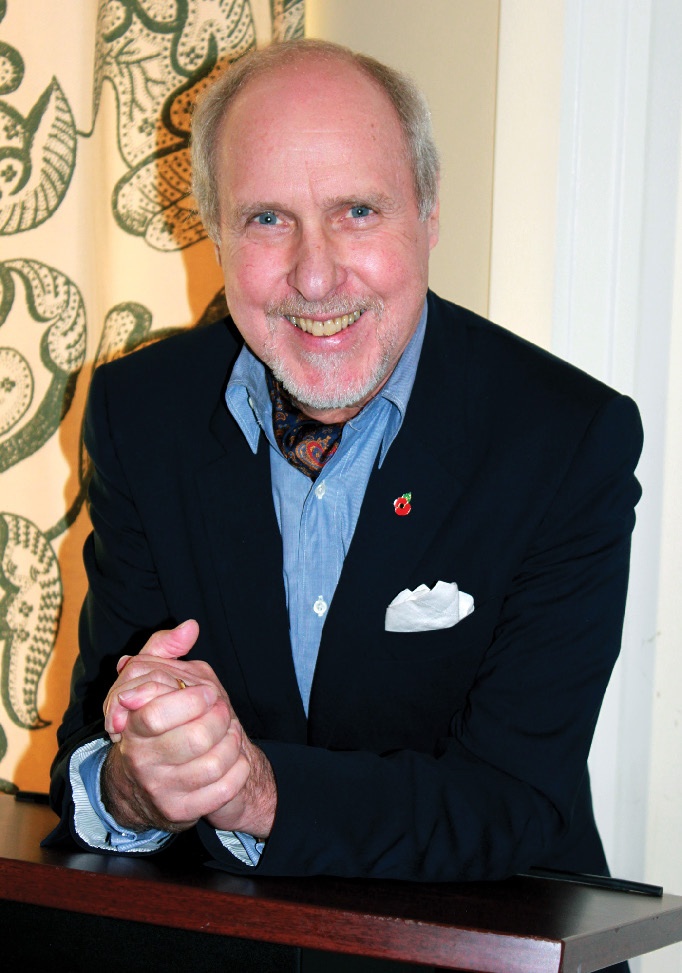Columbia College | Columbia University in the City of New York
Chilton Williamson Jr. ’69 Defends Western Culture as Editor, Evokes American West as Writer
While writing and editing are sometimes seen as competing tasks, Chilton Williamson Jr. ’69 balances the two sides of publishing with finesse. His latest novel will be released this summer, joining a collection of more than a dozen books written by Williamson. He also became editor of the monthly Chronicles: A Magazine of American Culture in June 2015 after being its senior editor for books since 1989.
Chronicles, which is celebrating its 40th anniversary this year, features articles and reviews from a conservative perspective on issues in American and Western culture, including history, philosophy, politics and the arts. As editor, Williamson writes the “In Our Time” column while shepherding contributing writers through the editorial process.

“I’ve learned a lot from him,” says James O. Tate GSAS’75, a regular contributor to Chronicles who has worked with Williamson for more than 30 years. “He gave me opportunities to write by throwing curveballs at me. I got more practice under my belt and enjoyed writing more and more, and I got it from him.”
Williamson immerses himself in his writing, living in remote communities around the country and taking copious notes about everything he observes. The resulting works blend fiction and nonfiction to create vivid characters based on real locations. In The Hundredth Meridian: Seasons and Travels in the New Old West (2005), a book of columns he wrote for Chronicles, the vast, detailed Western landscape becomes a character in itself.
Williamson began the series in 1994, five years after joining Chronicles as senior editor for books. Whether composing novels or nonfiction, he considers himself primarily a narrative writer. “I like to make experiences I have had live again,” he says. “For me, an experience is not real until it is transmuted as literature.”
These experiences are given vibrant life in his popular book Roughnecking It: Or, Life in the Overthrust (1982), an account of his work on a drilling rig in the gas fields of Wyoming in 1979. “Imagine an Ivy League, prep-school boy working on an oil rig,” Williamson says with a laugh. “It was the best year of my life, and I made lasting friends.” After completing the book in New York, two years later Williamson moved permanently to Kemmerer, Wyo., where he learned to ride and tame horses, hunt and butcher his own meat, and camp and survive in the mountains.
Though Williamson was born in New York City, he grew up with an appreciation for the outdoors from summers spent on his family’s farm in Vermont. His father, former Barnard history professor Chilton Williamson ’38, GSAS’48, still resides in Vermont. After graduating from Trinity School, Williamson attended college in Maine for a year before transferring to Columbia, following in the footsteps of his father, two uncles and a cousin.
Williamson majored in European history and performed with the Gilbert and Sullivan Society as an opera lover and trained singer. He studied American history at GSAS before leaving in 1973 to become history editor for St. Martin’s Press, where he worked for three years while writing essays and book reviews for publications including National Review, New Republic, Commonweal, Harper’s Magazine and The Nation.
“I like to make experiences I have had live again. For me, an experience is not real until it is transmuted as literature.”
Williamson moved to National Review full time in 1976 as literary editor. The following year, he began commuting to New York biweekly to work at the magazine while living off the coast of Rhode Island to gather material for his first book, Saltbound: A Block Island Winter (1980). When he moved to Kemmerer, he arranged with National Review to continue working remotely on his section of the magazine via phone and mail and traveled to New York every month or two while compiling material for Roughnecking It.
“He’s very disciplined,” says Tate. “He wanted to be a Westerner, and the next thing I knew, he had two horses and we were camping out West. It’s not a problem for him to relate to anybody in any walk of life in any location. I’ve always admired that.”
Williamson has traveled throughout the American Southwest and Mexico, using the locations as settings for his books, including his most acclaimed novel, Mexico Way (2008). He now lives with his wife in Laramie, Wyo., where he is a cantor at Mass and enjoys outdoor sports that range from hiking to hunting to skiing.
With hundreds of articles and reviews to his credit, Williamson is finalizing Jerusalem, Jerusalem!, his third novel in a trilogy preceded by Desert Light (1987) and The Homestead (1990). While he identifies first as a novelist, Williamson also loves his role as editor. “I want the magazine to be more immediately topical, and with a reinforced political edge added to the cultural one,” he says.
“We are not a political magazine,” he emphasizes, “let alone a partisan one. My interest in day-to-day politics and political strategy is small. Having been trained as an historian, I tend to regard contemporary politics as history in its present moment. Chronicles has always been dedicated to the proposition that political solutions for social, cultural and moral ills are not the answer to most human troubles ... Cultural efforts can improve and save the country, but partisan politics cannot.”
Laura Butchy SOA’04 is a professor of humanities at Plaza College and a freelance dramaturg and writer based in Queens.
Issue Contents
Published three times a year by Columbia College for alumni, students, faculty, parents and friends.
Columbia Alumni Center
622 W. 113th St., MC 4530, 6th Fl.
New York, NY 10025
212-851-7852
cct@columbia.edu
Columbia Alumni Center
622 W. 113th St., MC 4530, 4th Fl.
New York, NY 10025
212-851-7488
ccalumni@columbia.edu

